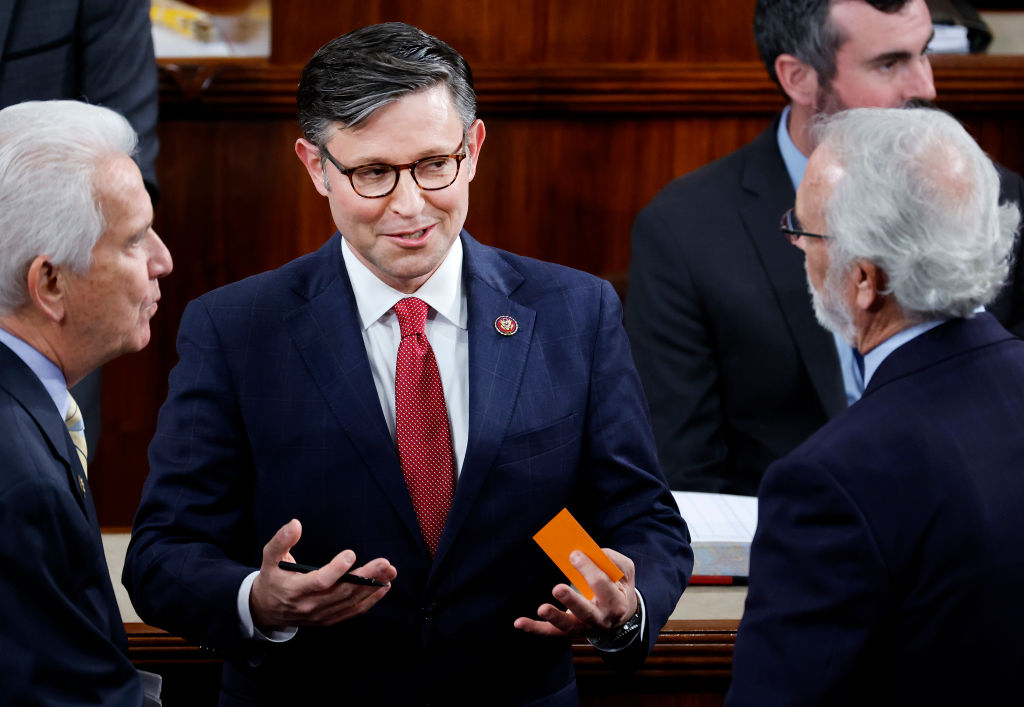
“MAGA is ascendant,” crowed Rep. Matt Gaetz (R., FL) on October 25. He had reason to be happy. After weeks of chaos, the House Republicans have settled on the unknown Rep. Mike Johnson (R., LA) to replace Rep. Kevin McCarthy (R., CA). The well-liked Johnson is thoroughly in line with nationalist-populist Republicans such as Gaetz, who engineered McCarthy’s fall. The episode was another sign that the GOP is no longer Ronald Reagan’s party. It is Donald Trump’s.
Since Reagan left office 35 years ago, the GOP has defined itself negatively. The coalition comes together not based on an affirmative program but in protest over someone else’s. The party's greatest moments have been acts of rebuke.
First came the election of 1994. Republicans won control of Congress for the first time in 40 years in a rejection of Bill Clinton’s health care plan, tax hikes, and liberal social views. George W. Bush ran in 2000 to “restore integrity to the White House,” a subtle dig at the character of his otherwise popular predecessor.
Things became more difficult for Republicans as affluent voters and voters with advanced degrees, along with Millennial and eventually Gen Z voters, turned away from social conservatism. The failures of the Bush administration didn’t make things easier. Nor did the lackluster presidential campaigns of John McCain and Mitt Romney.
Barack Obama inadvertently reassembled the Reagan coalition of white college-educated married couples in the suburbs. These upwardly mobile professionals, many of whom were religiously observant, combined with traditional GOP constituencies in the Great Plains, evangelical Protestant communities in the South, and white noncollege voters in the Rust Belt.
In 2010 and 2014, Republican candidates defied Obama. By the time he departed the White House, the Democratic party was in shambles. Republicans held the House, the Senate, most governor’s mansions, and two-thirds of state legislative chambers. This was not because voters loved the GOP. It was because voters saw the GOP as the way to block Democratic overreach. Obama was a gift to the Republican Party: a limitless source of conservative outrage that powered the party’s candidates to ever greater heights.
Obama and his advisers believed that the right mix of Progressive policies would defeat populist resistance. “My hope is that if the American people send a message” to Republicans, Obama told Rolling Stone in 2012, and “they suffer some losses in this next election, that there’s going to be some self-reflection going on—that it might break the fever.” The message was never sent. The “fever” behind grassroots rejection of Obama’s presidency did not break. It intensified. It assumed the form of Trump.
Read More: The Only Way to Fix Congress
Reagan led a party of insiders—aspirational leaders invested in America’s institutions. Trump, by contrast, is the outsider-in-chief. His coalition also looks different than Reagan’s. As the electorate became more educated, politics became a struggle over cultural values. And as those values swung left on immigration, race, climate, sex and gender, and national pride, America has become divided by geography and education. In 2016 Hillary Clinton became the first Democrat to win college-educated white voters since 1956. Biden won them again in 2020. Republican pollster Bill McInturff says that in 2012 the GOP was split: 48 percent of Republicans did not have college degrees; 40 percent did. By 2022, the share of Republicans without degrees had grown to 62 percent. The share of Republicans with a bachelor’s fell to 25 percent.
This GOP—Trump’s GOP—is down-market, confrontational, politically incorrect, suspicious of institutional authority, and uninterested in following rules set by liberals. Senator Mitt Romney of Utah’s retirement announcement was tacit recognition that the Republican Party that ran him for president a little more than 10 years ago no longer exists. The party that nominated Reagan 40 years ago is gone as well.
Perhaps that is how it should be. Parties and movements change. Reagan was more of a social conservative than conservative icon Barry Goldwater, who was more of a foreign-policy hawk than previous GOP leaders. The issue set of the Trump era—migration, the rise of China and Silicon Valley, the whopping returns to participation in the information economy, conservative control of the Supreme Court—is a far cry from what Reagan had to deal with.
Republicans and conservatives must cope with the social and economic conditions of our time, not Reagan’s. They must strengthen the best aspects of our society and culture while ameliorating the worst. That could mean adopting new attitudes toward the global economy and cultural institutions while unraveling the unaccountable bureaucratic structure of the administrative state.
What it cannot mean—what it can never mean—is abandoning the American tradition of liberty under law to satisfy the ego of a single man.
More Must-Reads from TIME
- How Donald Trump Won
- The Best Inventions of 2024
- Why Sleep Is the Key to Living Longer
- Robert Zemeckis Just Wants to Move You
- How to Break 8 Toxic Communication Habits
- Nicola Coughlan Bet on Herself—And Won
- Why Vinegar Is So Good for You
- Meet TIME's Newest Class of Next Generation Leaders
Contact us at letters@time.com